DCPA NEWS CENTER
Enjoy the best stories and perspectives from the theatre world today.
Enjoy the best stories and perspectives from the theatre world today.

The Denver Botanic Gardens, York Street. Photo courtesy of DBG
Climate change is hard to ignore. Whether you’ve experienced a wildfire in our state, seen images of polar ice caps crashing into the sea, or are just attuned to more extreme weather patterns, our world is changing. With these changes come different approaches to the ways in which we live…and local groups who are doing their part to help.
Take the City of Denver’s recent decision to offer free composting next year, RTD’s month-long “Free Fare for Better Air” campaign, and Denver’s climate plan to cut greenhouse gas emissions 100% by 2040. Any one effort alone might not be enough to create massive change, but together our community can create a brighter future.
A brighter, more sustainable future is exactly what one community partner has been doing for decades. The Denver Botanic Gardens has long been committed to protecting the environment.
“In my mind the concept of corporate social responsibility is a three-legged stool,” explained Jennifer Riley-Chetwynd, Director of Marketing and Social Responsibility at the Denver Botanic Gardens. “If you’re going to have a sound business, then you’ve got to have a sound people policy, sound social policy and sound environmental policy.”
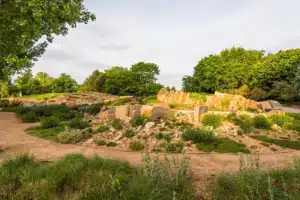
The Steppe Garden at Denver Botanic Gardens. Photo courtesy of DBG
If you visit either of the Gardens’ two locations at York Street or Chatfield Farms, you can see ample examples of their environmental policy in action. Composting, solar panels, and water wise flowers and plants that serve as important lessons to home gardeners. An even easier way to get educated and inspired is to use the Gardens Navigator feature on their website for a repository of plants that are appropriate for our climate.
“But our best tool is a partnership with Colorado State University (CSU). It’s called ‘Plant Select,’” continued Riley-Chetwynd. “Working with CSU, our horticulturist and their scientists research plants from around the world that grow in other ‘steppe climates,’ which are defined by low water, hot summers and cold winters. There are steppe climates in Mongolia in Central Asia; Patagonia in South America; and South Africa. So what grows there is going to grow here.
“We do find that whether it’s a steppe climate around the world that shares our characteristics or someone just dealing with water scarcity issues, the more information we share the better off we are.”
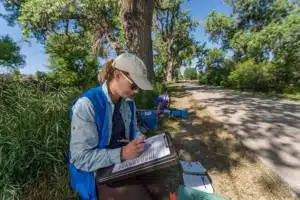
Denver Botanic Gardens ecologist records data during an ecological survey of an urban greenway in Denver. Photo courtesy of DBG
The Gardens participates with the One World One Water, LLC, a consortium of water experts who are working to improve the quality and efficiency of global water systems and resources. Based in Rome, the consortium focuses on diplomacy, planning and communications, but “it’s also where, right now, they’re suffering from a crippling drought.” And while Italy may not be equipped for this unprecedented problem, partners like the Gardens have answers. “We might have best practices in terms of low water use irrigation for crops or just water management, so we want to stimulate those conversations,” Riley-Chetwynd added.
While the Gardens may offer its expertise to international partners, its staff also lends their advice on responsible planting to area municipalities.
“We’ve worked with Greenwood Village, Lakewood, Cherry Creek North and Aurora to guide them on landscaping for lower maintenance, lower water use options,” said Riley-Chetwynd.
“Eventually, we’re going to extend that to residential as well. We probably won’t make house calls, but I think consulting with new housing developments to make sure that they plant only a limited amount of turfgrass plus provide a plant palette that’s cost effective and requires less water will help guide people as they’re getting started.”
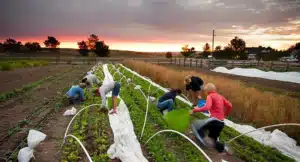
Photo courtesy of DBG
While digging in the dirt to create beautiful scenery comes naturally to the Gardens team, they also incorporate more innovative approaches.
“A big element we have at our Chatfield location involves solar panels,” explained Riley-Chetwynd. “We’re working with NREL and the City of Denver to install agrivoltaic solar panels over the next few years.” These solar panels will be used not only to harness energy but also to provide shade for crops that will be planted underneath. “We get double the benefit — the runoff from condensation that accumulates overnight on the panels self-irrigates the crops and we’re generating power.”
Another innovation that is surprising in Colorado’s arid climate are solar powered atmospheric water harvesters. Used at both locations, Riley-Chetwynd described the system as a “super cool thing that kind of stops people in their tracks. They do what it sounds like — they capture water from the air and convert it into water to be used for irrigation.” While water in our air is scarce, this solar-powered water harvesting system is able to capture and utilize the water vapor that exists despite our lack of humidity.
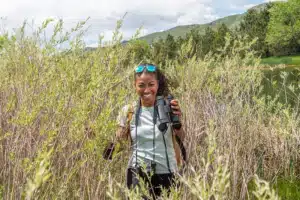
Photo courtesy of DBG
While water-wise planting, solar power and innovative technologies are important to uphold the Garden’s environmental efforts, these are not enough to complete that “three-legged stool” of sound environmental, social and people practices.
“We have these environmental programs that, yes, have environmental sustainability at their core, but the social part, the people part…who are we reaching? Who needs to hear about these programs? Who are we missing, most importantly?” Riley-Chetwynd questioned. “If people don’t automatically have access to food, we have to figure out how to get fresh produce to them.”
Take, for instance, the food chain disruption that has been experienced due to the war in the Ukraine. “A war breaks out and all of a sudden Ukraine, which was the breadbasket, is disconnected. [We hope something so drastic and severe won’t] be faced in the United States, but it could be,” she said noting the droughts and wildfires in the Western region of our country that jeopardize crops.
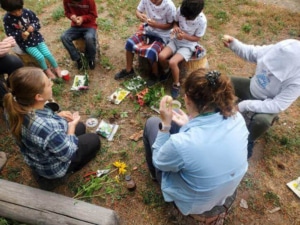
Photo courtesy of DBG
Not only does creating reliable, local food systems ensure a certain security, but it also means fewer carbon emissions, less waste and more job opportunities. In fact, the Chatfield Veterans Farm Program provides vets with an opportunity to explore new careers. “Many post-9/11 veterans may wonder ‘OK. What’s next career wise?’ And farming is a growing need,” she added. The Veterans Farm Program provides these individuals with vocational skills, therapeutic healing for those suffering from PTSD, self-healing connections with the land, and business skills including the ability to develop a business plan and distribution model.
“Food is our biggest opportunity to connect with people,” said Riley-Chetwynd. “Gardening may not be a regular feature in [a person’s] life, but when it comes to eating, almost everything comes from a plant.”
Food, water, sun, plants — all of the elements that we take for granted but are critical to the community we call home.
“We’ve always played a role of reminding Colorado what’s supposed to grow here naturally and how to care for it,” Riley-Chetwynd noted. “We can no longer solely rely on scientists, biologists or hydrologists. It’s going to take more.” It’s going to take all of us.
